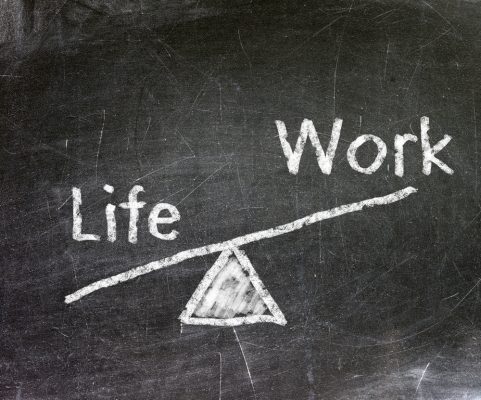Ever try balancing perfectly on a seesaw? In theory it’s possible, but in application, it doesn’t work very well for very long. One person usually spends a lot of time with their bum on the ground while the other’s is up in the air. They then try to re-balance and…they trade places with the opposite in the air and the other on the ground.
Let’s think for a moment about the construction of the popular term “work-life balance”. Simply allowing the question to be formed in that way “work-life balance”, we are creating an artificial duality, where evidently work is not life and life is not work, but rather they are two different elements to be “balanced”. Why have we surrendered our free will to the popular culture’s incredibly narrow and limiting definition of our lives?
All seasoned, successful entrepreneurs, whether engaged in leading for-profit or not-for-profit organizations, know that sustained achievement usually comes about as a result of significant, persistent, and in many cases risky work. Work that has risk of failure. Few great achievements are possible without passionate and determined work, right? Work that is so absorbing and challenging that…that candidly, sometimes little energy is left over, unless it is left for the more strenuous kinds of play or active leisure which serves to rejuvenate and restore our depleted physical and mental energy.
Do you believe as I do that the contemporary symptoms of anomie which urban populations exhibit, and where we default into faulty constructions like “work-life balance”, is intimately related to our estrangement from the life of the earth, from Mother Nature? Activities that bring us into contact with the simple life of the earth and our animal spirits have something profoundly satisfying in them, don’t they? Even after those activities stop, the happiness that they bring remains in our memory.
Will a generation that cannot do this be a generation of little people, divorced from Nature, unable to reach their full human potential, of people in whom their animal spirits wither? (Quick: what is the state of the tide? The phase of the moon?). A culture in which vital impulses—animal spirits—are not celebrated, but scolded, as though we are domesticated pets straining against our leash?
We fully recognize, don’t we, that as entrepreneurs, we very intentionally choose our calling—our purpose, the “why” we do what we do. We choose how we operationalize it, whom we work with, and where we work. Our lives are full of relationships, activities, goals: purpose, romance, kids, social sector causes, aging parents, investments, destinations to explore, extended friend relationships, and on and on. Why should we fit them all into the pop culture’s nice neat “work-life balance”? We know that the most effective solutions to the challenges in our complex lives come at the intersections of disciplines. We integrate them. It is a real gift.
There exists no randomized double-blind controlled study on this. But what I have repeatedly observed in my thirty-plus years of scar tissue is that sustained, high performing entrepreneurs purposefully design their lives so that work and non-work purpose, relationships, and activities are integrated, not merely balanced.
Sure, you might get away with trying the balance thing for a while if you live/work in the bureaucratic time and effort world. Maybe there you can hide, play dead. But, most people in the bureaucratic world die at age 25. They just aren’t put in the coffin until 60 years later. Life is growth baby—if you play dead, you are dead. Light a candle in the dark. Why give up your bad assery to conform with the expectations of the bureaucratic consumer pop culture?
Rest is essential for good work. Work is as essential as rest. The questions we ask matter. So let’s co-create better questions. Work-life balance? Schmalance. Work-life integration? Hell yeah.
Of Note: References and Further Reading:
Ferriss, Timothy. 2016. The Tools of Titans. New York, Houghton Mifflin Harcourt.
Gottlieb, Anthony. 2016. The Dream of Enlightenment. London, Liveright.
Grant, Adam. 2016. Originals: How Non Conformists Move the World. New York, Viking.
Harari, Noah, Yuval. 2017. Homo Deus: A Brief History of Tomorrow. New York, Harper Collins. in pre release galley proof.
Harari, Noah, Yuval. 2015. Sapiens: A Brief History of Humankind. New York, Harper Collins.
Henry, Todd. 2013. Die Empty: Unleash Your Best Work Every Day. New York, Penguin.
Hirschman, Albert O. 1994. Exit, Voice, Loyalty. Cambridge, Harvard University Press.
Kelly, Kevin. 2016. The Inevitable: Understanding the 12 Technological Forces that Will Shape Our Future. New York, Viking Press.
Lewis, Michael. 2016. The Undoing Project: A Friendship That Changed Our Minds. New York, WW Norton.
Little, Bryan, R. 2013. Me, Myself, and Us: The Science of Personality and the Art of Well Being. New York, Hachette.
McCloskey, Deidre. 2016. Bourgeois Equality: How Ideas, Not Capital or Institutions, Enriched the World. Vol. 3 of the trilogy “The Bourgeois Era.” Chicago, University of Chicago Press.
Miller, Alice. 2008. The Drama of the Gifted Child: The Search for the True Self. New York, Hachette.
Pressfield, Steven. 2011. The War of Art. Santa Barbara, Black Irish Entertainment.
Ridley, Matt. 2015. The Evolution of Everything: How New Ideas Emerge. New York, Harper Collins.
Russell, Bertrand. 1996. The Conquest of Happiness. London, Liveright.
Seligman, Martin E. P. 2016. Homo Prospectus. New York, Oxford University Press.
© 2024 Bigelow LLC. All rights reserved.

